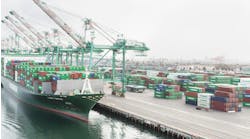Defined by Gartner as a technology that “applies advanced analysis and logic-based techniques, including machine learning (ML), to interpret events, support and automate decisions, and take actions,” artificial intelligence (AI) is getting a lot of buzz right now as companies grapple with a skilled labor shortage and ever-changing customer demands.
With its knack for managing mundane, repetitive tasks and freeing up employees to focus on more important things (i.e., solving complex problems, being creative, getting facetime with customers, etc.), AI has quickly gained momentum in supply chain management. Plagued with inefficiencies but expected to perform at high levels of efficiency and speed, this critical business component is ripe for improvement via AI, ML, and automation in general.
The Road to $1.3 Billion
According to a new Research and Markets report, AI is already revamping the operational process and facilitating cost-effective supply chain solutions. It says various forms of AI are being integrated into supply chain management solutions in order “to improve everything from process automation to providing greater visibility into static and real-time data as well as related management information systems.”
“In addition to fully automated decision making, AI systems are also leveraging various forms of cognitive computing to optimize the combined efforts of artificial and human intelligence,” reports Research and Markets, which estimates that the global AI in supply chain management market will reach $1.3 billion by 2024. “AI in supply chain management is enabling improved supply chain automation through the use of virtual assistants, which are used both internally (within a given enterprise) as well as between supply chain members (e.g., customer-supplier chains).”
According to Research and Markets, the combination of AI and the Internet of Things (IoT) in supply chains will improve operational flow and efficiency, with AI-supported supply chains becoming 45% more effective at on-time delivery with fewer errors.
It Won’t be Ignored
Named by Gartner as one of the top supply chain technology trends for 2019, AI stands as one of the technologies that supply chain leaders simply can’t ignore. Through self-learning and natural language, for example, “AI capabilities can help automate various supply chain processes such as demand forecasting, production planning, or predictive maintenance,” Gartner reports.
“AI supports the shift to broader supply chain automation that many organizations are seeking,” Gartner’s Christian Titze explained in a press release. “For example, AI can enhance risk mitigation by analyzing large sets of data, continuously identifying evolving patterns, and predicting disruptive events along with potential resolutions.
In “5 Examples of How AI Can Be Used Across the Supply Chain,” Blake Morgan writes that “AI is everywhere, but perhaps its greatest impact could be felt across the supply chain.” From anticipating orders to managing deliveries, the technology can “drastically increase efficiency in all areas of the supply chain,” she writes, noting that research firm McKinsey estimates that firms could gain $1.3 trillion to $2 trillion a year from using AI in supply chain and manufacturing.
Here’s How it Works
Companies are already posting good results from their AI investments, and particularly within their supply chains, Morgan writes. For example, Rolls Royce uses AI algorithms on its ships to sense what is around them in the water and classify items according to the danger they pose to the ship; UPS uses an AI-powered GPS tool to create the most efficient routes for its fleets; and Lineage Logistics uses an AI algorithm to forecast when food orders will arrive and leave a warehouse.
Expect to see more of these examples and successful pilot projects come to the surface as more companies experiment with AI in the supply chain. “When implemented and used correctly, artificial intelligence can enable exceptional agility and precision in supply chains, regardless of the industry,” Blume Global’s Pervinder Johar writes. “It can also ignite a transformational increase in efficiencies and decrease in costs where repetitive manual tasks can be automated.”











